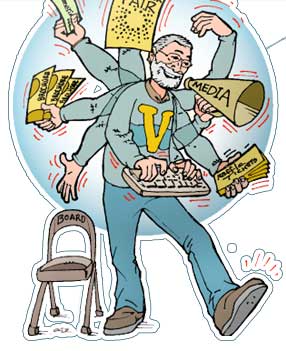








United Nations Targets Youth for its 2010-11 International Year
Brandon Sun “Small
World” Column, Saturday, May 15 / 10
Zack Gross
Zack Gross
The old saying is that “youth are our leaders of tomorrow.”
Some of us would say that youth should be considered our leaders of today, or at least should be full partners in shaping the worlds of today and tomorrow! Marking the 25th anniversary of the original United Nations International Year of Youth in 1985, the UN will do it again, beginning August 2010 until the same month in 2011.
A highlight of the year will be a major World Youth Conference to be held likely during the summer of 2011, but a variety of initiatives will be rolled out by all levels of government throughout that year in every “corner” of the globe.
“The International Year is about advancing the full and effective participation of youth in all aspects of society," a UN release says.
"We encourage all sectors of society to work in partnership with youth and youth organizations to better understand their needs and concerns, and to recognize the contributions that they can make to society.”
The world body subtitles its year as “Dialogue and Mutual Understanding. ” In 1985, the theme was “Participation, Development & Peace.”
As part of the lead-up to International Year of Youth, the World Program of Action for Youth has been adopted by the UN General Assembly to provide policies and guidelines for national and international action to improve the situation of young people around the world.
The General Assembly adopted 10 priority areas for youth issues in 1995 and then added another five in 2007.
These issues include education, employment, poverty, health, environment, addictions, delinquency, recreation, gender, globalization, HIV/AIDS, conflict, intergenerational relations, participation, and information/communication technologies.
These issues are largely the same whether one surveys young people in Europe, Africa or Canada.
Work done with young people in rural Manitoba communities identified recreation facilities, quality of education, employment opportunities, the state of our environment, and adult-youth relations as major concerns.
In the developing world, issues such as health/HIV, hunger and crime might come up more often. Not mentioned in the UN documentation, but an issue that arises in rural Canada and elsewhere is transportation, the ability of young people to easily get to recreational and sport activities and to jobs.
Many youth live in remote areas or without the means to participate fully in society and its benefits.
Young people aged 18 to 24 total 1.2 billion people in today’s world, 18% of the population.
While this potentially is a tremendous resource for the future, in poorer countries, many young people are under-educated and under-employed and find themselves standing around waiting for opportunities that aren’t coming.
This lack of advancement leads to poverty, frustration, boredom and, sometimes, crime and conflict. The United Nations and many other global, regional and local institutions are trying to find ways to increase the productivity, earning power and fulfillment of young people through training programs and job creation.
In our wealthier Western world, the current economy makes it hard for young people to get beyond “McJobs,” that is service sector, low-wage, part-time employment.
As well, whereas the previous generation was able to find a job and stick with a company or institution until retirement, today’s workforce members find themselves changing jobs frequently, doing contract work, or switching to entirely new professions at least three times in their careers.
In terms of youth participation in society, there is an enthusiastic desire in developing countries to be actively involved in a democratic society, while in our richer world, young people are often seen to be disinterested in voting, joining any movement or campaign, or expressing opinions.
When it comes to volunteerism, our young people are still quite active thanks to the encouragement of schools, government and religious institutions. But, this isn’t necessarily activism or community leadership.
Overseas, the idea of democracy, seldom truly seen in many developing countries, is embraced by young people, as is the opportunity to set up a small business or co-op and earn a living that allows them to marry, get further education and support children.
One hopes that the UN’s International Year of Youth, vintage 2010-11, will be a springboard to the betterment of all society.
Youth who are nurtured and trained to be active members and leaders of their communities and the world see that they can make a contribution that improves the lives of everyone around them, regardless of their age.
Zack Gross works for the Manitoba Council for International Co-operation (MCIC), a coalition of more than 40 international development organizations.
* * * * *
Return to Articles page
Return to Articles page